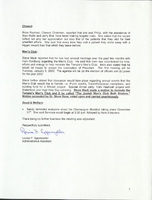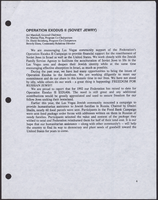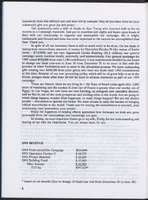Search the Special Collections and Archives Portal
Search Results

Interview with Erma (E.B.) Johnson, December 21, 2005
Date
Archival Collection
Description
Text

Minutes from Temple Beth Sholom Board of Directors meetings, June 1999 - December 1999
Date
Archival Collection
Description
Meeting minutes include reports from committees of the board, correspondence, and balance sheets.
Text

Transcript of interview with Gertrude Rudiak by Claytee White, January 11, 2007
Date
Archival Collection
Description
Gertrude (n?e Rightman) Rudiak was born in 1915 in North Dakota to Russian immigrants. She grew up in Wisconsin until 1924. That was the year the family drove to California via the Yellowstone Trail, a dusty, undeveloped road marked by yellow stones. In Los Angeles, her father practiced chiropractic, a holistic approach to well-being for which there was little knowledge at the time. Gertrude earned her music degree at University of California at Berkeley; a decision that did not lead to a career. She then attended a business college and got a job as a social worker in Northern California. In 1941, she met and soon married George Rudiak. It was the advent of World War II. George enlisted in the service and was assigned to Las Vegas Gunnery School (Nellis Air Force Base.) Since he had a law degree from University of California at Berkeley and passed the Nevada Bar exam, he found supplemental employment with local attorneys. Las Vegas became the Rudiaks? permanent home where they raised their five children. In this interview Gertrude recalls the stories of coming to live in Las Vegas of the 1940?s: their phone number was 1-2-3; the neighborhood they lived in longest being Scotch 80s and being part of the secular and Jewish communities.
Text

Transcript of interview with Justice Michael Cherry by Barbara Tabach, September 19, 2014
Date
Archival Collection
Description
Interview with Justice Michael Cherry by Barbara Tabach on September 19, 2014. In this interview, Justice Cherry talks about how he came to Las Vegas and his work as a public defender and as a lawyer in private practice. He also discusses his involvement with Jewish organizations in various capacities, and his involvement with high-profile cases such as the MGM Grand and Las Vegas Hilton fires, earning him the nickname "master of disaster."
Justice Michael Cherry was born in St. Louis, Missouri, and went on to spend his childhood in the Jewish neighborhood of University City. He attended University of Missouri and became a leader in his fraternity, Alpha Epsilon Pi, and a committed ROTC cadet. By the time Justice Cherry graduated from Missouri and was heading to Washington University School of Law, he was a second lieutenant; halfway through law school, he was promoted to first lieutenant. It was also during law school that he married his college sweetheart, Rachel Wolfson. When a bad back prevented him from becoming an active air force officer, he and his wife decided to follow his mother to Las Vegas. Justice Cherry worked both as a law clerk with the Public Defender's Office as well as a security guard at Wonder World when he first moved to the city. After passing the Nevada bar, Cherry took at position with the Public Defender's Office, and later went into private practice as a successful criminal defense attorney. Cherry was elected as district judge in 1998 and 2002. In 2006, he won his campaign for state Supreme Court justice. Justice Cherry was reelected to office in 2012 for another four-year term. He is currently the highest-positioned Jewish official in the state of Nevada. Throughout his years in Las Vegas, Justice Cherry has been an extremely active and influential member of the Jewish community and served as chairman of the Anti-Defamation League and is active in the Jewish Federation. Justice Cherry attributes his commitment to service to his mother. In addition to his service to the Jewish community, he has been active in numerous other service organizations, including March of Dimes, Olive Crest, Adoption Exchange and American Cancer Society.
Text

Transcript of interview with Mahamed Youssouf by Barbara Tabach, August 6, 2013 & August 13, 2013
Date
Archival Collection
Description
Ethiopian business owner Mahamed Youssouf became an American citizen in 1986. Born in Harar, Ethiopia, he recalls the hardships he had to endure during the Ethiopia-Somalia conflict. Coming from a family of tailors, he began making clothes with his father at a very early age. Mahamed’s recollections concerning his journey from political refugee to successful businessman demonstrates his resilience and determination to overcome obstacles and achieve his goals. Mahamed moved to Las Vegas, Nevada in 1985, where he rented a storefront in North Las Vegas. The name of his store was Uniform Plus and he focused mainly on making children’s clothes. His efforts proved lucrative as he began buying wholesale in Los Angeles, California, and selling clothes in Las Vegas on the weekends at the outdoor Swap Meet. After a fateful encounter, Mahamed became business partners with Eugene Hoffman, owner of Village East Cleaners. Mahamed firmly believes that communication is the key to socio-economic success. He views education as an investment and states that, “to have dialogue means better relationships.” When the Ethiopian government was overthrown, Mahamed returned home to Africa for a visit. He met his wife while there, got married, and started a family. Mahamed returned to America and bought a family home in Las Vegas. He dedicated his time to teaching his American born children more about Ethiopian culture and taught himself more about American culture— including the African-American experience in Las Vegas, racism, the Moulin Rouge, and the Westside.
Text

Transcript of interview with Susan Jones Watson by Claytee White, February 20, 2013
Date
Archival Collection
Description
A resident of Southern Nevada from the age of three, Susan Watson shares her memories of growing up and living in Las Vegas. After a year in Boulder City, Susan's father bought an old army barrack and converted it to a home in North Las Vegas; Susan remembers playing in the desert with her siblings and attending elementary and middle school before starting at Rancho High. Watching her mother design costumes for Strip performers and beautiful dresses for her own high school dances no doubt helped Susan develop her own sense of taste and style - something that she would put to good use over many years as an interior designer. Before that though, Susan shares her memories of what life was like in the Las Vegas of the 1950s and 1960s: cruising Fremont Street; movie nights; after-school work; favorite teachers; lunches on the lawn; and dance club. All combine to paint a vivid picture of a smaller town and a simpler time in the Las Vegas valley.
Text

Lisa Hank oral history interview: transcript
Date
Archival Collection
Description
Oral history interview with Lisa Hank conducted by Barbara Tabach on May 31, 2019 for the Remembering 1 October Oral History Project.
Lisa discusses her move to Las Vegas in the early 1990s from California for a job with the Las Vegas Metropolitan Police Department, and her current position as head of the Police Employee Assistance Program (PEAP). Lisa talks about the night of October 1 and the aftermath of the shooting, both in her work and personal life. She is the wife of Charles Hank III, police officer and another interviewee for the Remembering 1 October Oral History Project.
Subjects discussed include: well-being in aftermath of 1 October; PEAP preparation; healing.
Text

Transcript of interview with Elmer Hilsinger by Irene Rostine, October 2, 1991
Date
Archival Collection
Description
When Mr. Elmer Hilsinger arrived from the Los Angeles area in 1942, to work as a Refractory Inspector in the Engineering Department at Basic Magnesium Incorporated (BMI), little did he know the town site would grow to be known as Henderson, Nevadain a few short decades. Mr. Hilsinger’s oral history provides a glimpse of the work being done by women at BMI, including women working as chemists, truck drivers, and secretaries. His words attest to the strong work ethic demonstrated by women at the plant during the “war work” period. Through Mr. Hilsinger’s story, we are also provided with an account of what daily life was like for a married couple, including Mr. Hilsinger’s life with his wife who worked as a waitress at Anderson Camp. In addition, Mr. Hilsinger’s oral history touches on the evolution of safety rules within the plant, the transition from the American Federation of Labor Union to the Congress of Industrial Organizations Union, and the role prostitution played during the tim
Text


